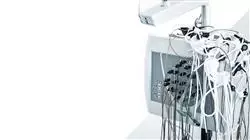University certificate
The world's largest faculty of medicine”
Introduction to the Program
TECH offers you a flexible program, allowing you to combine your professional responsibilities with a quality program"

Medical professionals are aware that if they wants to offer the patient the most complete service through extensive and specialized knowledge that allows them to make the most accurate diagnoses and the most optimal treatments. With the aim of keeping the professional up to date in the field of functional neuroanatomy, this Postgraduate certificate was made in an exclusive format in online mode, taught by a highly qualified teaching team and with experience in this area.
With the multimedia content thatTECH uses in all its degrees, the professional will update knowledge in a more dynamic and enjoyable way. Thus, through video summaries, videos in detail, interactive diagrams or specialized readings, students will delve into the basics of frontal lobe functioning for 6 weeks, in the neuropsychology of the dorsolateral and orbitofrontal prefrontal cortex, the motor cortex or the temporal lobe. The real clinical cases provided by the teaching team give you the opportunity to get closer to reality and advance in their clinical praxis.
The professional is, therefore, before a teaching with a theoretical-practical approach that will allow him to achieve the renewal of knowledge comfortably. To do this, you will only need a computer, tablet or mobile with an internet connection with which to fully access the entire agenda of this intensive Postgraduate certificate Likewise, the Relearningsystem, based on the repetition of content, will favor progression through out the program in a more natural way, reducing the long hours of study so common in other teaching methods.
You are facing a degree that gives you the opportunity to comfortably delve into the neuropsychology of the dorsolateral prefrontal cortex”
This Postgraduate certificate in Principles of Functional Neuroanatomy contains the most complete and up-to-date scientific program on the market. The most important features include:
- The development of practical cases presented by experts in Psychology and Neurology
- The graphic, schematic, and practical contents with which they are created, provide scientific and practical information on the disciplines that are essential for professional practice
- Practical exercises where the self-assessment process can be carried out to improve learning
- Its special emphasis on innovative methodologies
- Theoretical lessons, questions for the expert, debate forums on controversial topics, and individual reflection assignments
- Content that is accessible from any fixed or portable device with an Internet connection
150 hours of up-to-date content and with the latest technology applied to education”
The program includes, in its teaching staff, professionals from the sector who bring to this program the experience of their work, in addition to recognized specialists from prestigious reference societies and universities.
Its multimedia content, developed with the latest educational technology, will provide the professional with situated and contextual learning, i.e., a simulated environment that will provide an immersive education designed to learn in real situations.
This program’s design focuses on Problem-Based Learning, through which the professional must try to solve the different professional practice situations that arise during the academic program. This will be done with the help of an innovative system of interactive videos made by renowned experts.
An educational program with which you can renew your knowledge about the functioning of the temporal, parietal and occipital lobe"

In just 6 weeks you will get the knowledge update on functional neuroanatomy that you are looking for"
Why study at TECH?
TECH is the world’s largest online university. With an impressive catalog of more than 14,000 university programs available in 11 languages, it is positioned as a leader in employability, with a 99% job placement rate. In addition, it relies on an enormous faculty of more than 6,000 professors of the highest international renown.

Study at the world's largest online university and guarantee your professional success. The future starts at TECH”
The world’s best online university according to FORBES
The prestigious Forbes magazine, specialized in business and finance, has highlighted TECH as “the world's best online university” This is what they have recently stated in an article in their digital edition in which they echo the success story of this institution, “thanks to the academic offer it provides, the selection of its teaching staff, and an innovative learning method aimed at educating the professionals of the future”
A revolutionary study method, a cutting-edge faculty and a practical focus: the key to TECH's success.
The most complete study plans on the university scene
TECH offers the most complete study plans on the university scene, with syllabuses that cover fundamental concepts and, at the same time, the main scientific advances in their specific scientific areas. In addition, these programs are continuously being updated to guarantee students the academic vanguard and the most in-demand professional skills. In this way, the university's qualifications provide its graduates with a significant advantage to propel their careers to success.
TECH offers the most comprehensive and intensive study plans on the current university scene.
A world-class teaching staff
TECH's teaching staff is made up of more than 6,000 professors with the highest international recognition. Professors, researchers and top executives of multinational companies, including Isaiah Covington, performance coach of the Boston Celtics; Magda Romanska, principal investigator at Harvard MetaLAB; Ignacio Wistumba, chairman of the department of translational molecular pathology at MD Anderson Cancer Center; and D.W. Pine, creative director of TIME magazine, among others.
Internationally renowned experts, specialized in different branches of Health, Technology, Communication and Business, form part of the TECH faculty.
A unique learning method
TECH is the first university to use Relearning in all its programs. It is the best online learning methodology, accredited with international teaching quality certifications, provided by prestigious educational agencies. In addition, this disruptive educational model is complemented with the “Case Method”, thereby setting up a unique online teaching strategy. Innovative teaching resources are also implemented, including detailed videos, infographics and interactive summaries.
TECH combines Relearning and the Case Method in all its university programs to guarantee excellent theoretical and practical learning, studying whenever and wherever you want.
The world's largest online university
TECH is the world’s largest online university. We are the largest educational institution, with the best and widest online educational catalog, one hundred percent online and covering the vast majority of areas of knowledge. We offer a large selection of our own degrees and accredited online undergraduate and postgraduate degrees. In total, more than 14,000 university degrees, in eleven different languages, make us the largest educational largest in the world.
TECH has the world's most extensive catalog of academic and official programs, available in more than 11 languages.
Google Premier Partner
The American technology giant has awarded TECH the Google Google Premier Partner badge. This award, which is only available to 3% of the world's companies, highlights the efficient, flexible and tailored experience that this university provides to students. The recognition as a Google Premier Partner not only accredits the maximum rigor, performance and investment in TECH's digital infrastructures, but also places this university as one of the world's leading technology companies.
Google has positioned TECH in the top 3% of the world's most important technology companies by awarding it its Google Premier Partner badge.
The official online university of the NBA
TECH is the official online university of the NBA. Thanks to our agreement with the biggest league in basketball, we offer our students exclusive university programs, as well as a wide variety of educational resources focused on the business of the league and other areas of the sports industry. Each program is made up of a uniquely designed syllabus and features exceptional guest hosts: professionals with a distinguished sports background who will offer their expertise on the most relevant topics.
TECH has been selected by the NBA, the world's top basketball league, as its official online university.
The top-rated university by its students
Students have positioned TECH as the world's top-rated university on the main review websites, with a highest rating of 4.9 out of 5, obtained from more than 1,000 reviews. These results consolidate TECH as the benchmark university institution at an international level, reflecting the excellence and positive impact of its educational model.” reflecting the excellence and positive impact of its educational model.”
TECH is the world’s top-rated university by its students.
Leaders in employability
TECH has managed to become the leading university in employability. 99% of its students obtain jobs in the academic field they have studied, within one year of completing any of the university's programs. A similar number achieve immediate career enhancement. All this thanks to a study methodology that bases its effectiveness on the acquisition of practical skills, which are absolutely necessary for professional development.
99% of TECH graduates find a job within a year of completing their studies.
Postgraduate Certificate in Principles of Functional Neuroanatomy
Functional neuroanatomy is a branch of neuroscience that focuses on how different brain structures are organized and function to generate complex behaviors and mental processes. This discipline focuses on the study of the structure and function of the nervous system in relation to behavior, cognition, emotion and other psychological processes.
The goal of functional neuroanatomy is to understand how information is carried out in the brain to generate specific behaviors and cognitive processes. To achieve this, various analytical techniques are used, such as neuroimaging, electroencephalography, non-invasive brain stimulation, and genetics.
Functional neuroanatomy is made up of several areas of specialization, each focusing on different aspects of the brain and its functions.
Neuropsychology, which studies the relationships between the brain and behavior.
Neurophysiology, which focuses on the electrophysiological functions of the brain.
Neurochemistry, which studies chemical processes in the brain and their relationship to brain functions.
Neuroplasticity, which investigates how the brain changes and adapts in response to experience, learning and injury.
The development of functional neuroanatomy involves a wide range of studies, including both basic and applied research. Neuroscientists working in this area can use in vivo and in vitro research techniques to study how different brain structures interact to produce complex mental and behavioral processes.
As more is discovered about functional neuroanatomy, new treatments can be developed for neurodegenerative diseases, autism spectrum disorders, mood disorders and other brain disorders. Functional neuroanatomy is an important discipline for our understanding of the brain and how it influences behavior and cognition.
This course focuses on the detailed study of the structure and functions of the central and peripheral nervous system, and how these systems interact to control behavior and cognitive functions.







